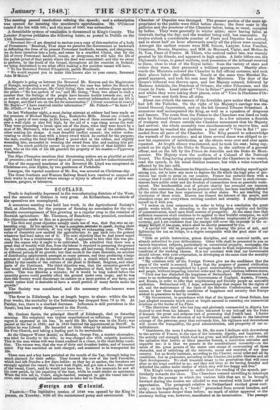C OTIAND.
Trade is deplorably depressed in the manufacturing districts of the West; and the amount of distress is very great. At Kilbarcham, two-thirds of the operatives are unemployed.
A numerous meeting was held last week, in the Agricultural Society's Hall, at Aberdeen, for the purpose of forming an association for the sys- tematic encouragement of flax-growing as a regular crop in the rotation of Scottish agriculture: Mr. Thomson, of Banchory, who presided, combated the objections made to flax as a general crop-
" The first and great objection usually made use of was, that flax-was an ex- hausting crop. In his opinion, it weer asomplete-unstake to Apeak, during these days of agricultural science, of any crop tieing an exhausting crop, The disco- veries of chemistry now enabled the agriculturists to pus back into the ground whatever had been taken out of it. The next objection that he had heard urged was, that it was a troublesome crop. Now, it appeared to him that this was pre- cisely the reason why it ought to be cultivated. He admitted that there was a great deal of trouble with flax, from the labour it required in preparing the ground fur its culture, and,ftom the number of persons old and young, whom it employed at different periodiM its growth: but that marisit the more desirable, on amount of distributing euiPloyment amongst so many persons, and thus producing a large amount of comfort to the labourers it employed; a result which was well exem- plified by thereaults of the culture of the plant in Holland, Belgium, and other parts of the Continent. The third objection was, that the extensive growth of flay would withdraw the ground from the production of food, both for men and cattle. This was -likewise a mistake; for it would be long indeed before the quantity grown could possibly affect the ground under corn, crops; and he was sure this Society would discourage its culture on a large portion of any farm, and would rather hold it desirable to have a small portion of many farms under its growth."
The Society was constituted, and the necessary office-bearers were appointed. . .
The fever in Edinburgh has at length begun to abate: within the last four weeks, the mortality in the Infirmarrhas dropped from 76 to 30. At Paisley, too, there is a marked decrease. Influenza is still prevalent in the South; but,,bas nearly disappeared in the North.
Mr. Graham Speirs, the principal Sheriff of Edinburgh, died on Saturday morning. His complaint was typhus superinduced on influenza. Very general regret is expressed at his loss. In early life Mr. Speirs was in the Navy; was passed at the bar in 1820; and in 1840 received his appointment as Sheriff. In politics lie was Liberal. He hazarded no little obloquy by attaching himself to the Free Church, and taking a leading part in its movements. . At the Glasgow Winter Assira; on Monday, George Fay, a mister shoemaker, was tried for cruelty to his wife- he was charged also with culpable homicide.
This is the man whose wife was wife; he in a closet, in the most filthy condi- tion. The excuse was, that she was of dirty and drunken habits, and of unsound mind. Fay was convicted on both charges; and sentenced to be transported for life.
Three men and a boy. have perished at the mouth of the Tay, through being too much alarmed for their safety. They formed the crew of the bark Favourite, which had left Dundee a few days before: as they lay at anchor, the breakers set strongly against the vessel; the crew took fright, and got into a boat ; the master of the vessel, Court, said he would not leave her. In a few moments he saw all his crew perish, by the capsizing of the boat, while he could render no assistance. When the tide set in, Court, single-handed, managed to get the vessel into the river, and eventually obtained assistance to take her to Dundee.






























 Previous page
Previous page